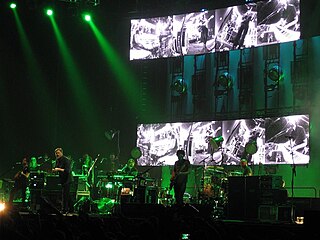
Freddie Mercury was a British singer, songwriter, record producer, and lead vocalist of the rock band Queen. Regarded as one of the greatest lead singers in the history of rock music, he was known for his flamboyant stage persona and four-octave vocal range.

The Grand Junction Railway (GJR) was an early railway company in the United Kingdom, which existed between 1833 and 1846 when it was amalgamated with other railways to form the London and North Western Railway. The line built by the company was the first trunk railway to be completed in England, and arguably the world's first long-distance railway with steam traction.

Elbow are an English rock band formed in Bury, Manchester, in 1997. The band consists of Guy Garvey, Craig Potter, Mark Potter and Pete Turner. They have played together since 1990, adopting the name Elbow in 1997. Drummer Alex Reeves replaced Richard Jupp first as session performer in 2016, which he continues to be.

Freddie and the Dreamers were an English beat band that had a number of hit records between May 1963 and November 1965. The band's stage act was enlivened by the comic antics of the 5-foot-3-inch-tall (1.60m) Freddie Garrity, who would bounce around the stage with arms and legs flying.
Autocode is the name of a family of "simplified coding systems", later called programming languages, devised in the 1950s and 1960s for a series of digital computers at the Universities of Manchester, Cambridge and London. Autocode was a generic term; the autocodes for different machines were not necessarily closely related as are, for example, the different versions of the single language Fortran.
The Mercury was an early commercial computer from the mid-1950s built by Ferranti. It was the successor to the Ferranti Mark 1, adding a floating point unit for improved performance, and increased reliability by replacing the Williams tube memory with core memory and using more solid-state components. The computer had roughly 2000 vacuum tubes and 2000 germanium diodes. Nineteen Mercuries were sold before Ferranti moved on to newer designs.